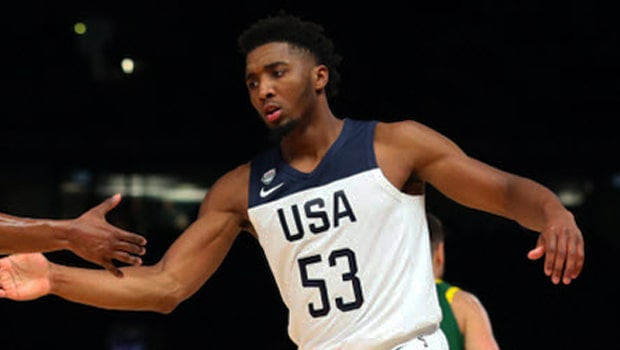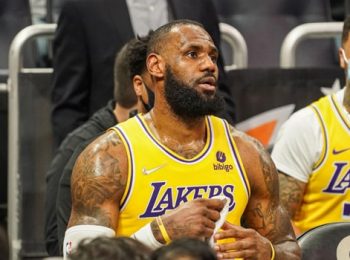The Cleveland Cavaliers face an important identity question after their 2024-25 campaign. Donovan Mitchell had arguably the best regular season of his NBA career, finishing fifth in MVP voting and leading Cleveland to the No. 1 seed in the Eastern Conference. However, the team stumbled in the playoffs, falling in five games to the Indiana Pacers in the second round.
With Mitchell signed long-term and expected to be the franchise centerpiece, the debate now shifts toward how the Cavaliers should structure their offense moving forward.
Donovan Mitchell’s Best Year as a Cavalier
Mitchell’s 2024-25 regular season marked a significant chapter in his NBA journey, as he powered Cleveland to heights they had not reached in years. His fifth-place finish in MVP voting cemented his stature as one of the league’s elite.
By guiding the Cavaliers to the top seed in the Eastern Conference, he validated his impact beyond mere scoring, demonstrating leadership and clutch performances across the campaign. The narrative around him has now shifted from being just an elite scorer to a central figure who defines the franchise’s ceiling in both the regular season and playoffs.
Donovan Mitchell averaged 24 points per game, the same figure he produced during the 2019-20 season with the Utah Jazz. While this was his lowest scoring average in several years, his overall efficiency, defensive contributions, and leadership helped propel Cleveland to the East’s No. 1 seed. His placement in MVP voting highlighted how much weight his performances carried, even if the raw scoring totals didn’t reflect his absolute peak.
Cleveland’s Playoff Struggles Against Indiana
Despite finishing first in the East, the Cavaliers were unable to translate their dominance into playoff success. In the second round, they faced the Indiana Pacers and were eliminated in just five games.
The abrupt exit cast a shadow on an otherwise historic regular season for Cleveland. Questions quickly surfaced regarding whether the Cavs had maximized their roster’s potential and whether Mitchell’s role within the offense was being used in the most effective way possible.
The Pacers exposed flaws in Cleveland’s offensive balance. Mitchell shouldered heavy scoring responsibilities, but the lack of offensive versatility around him became evident. The result was another “flameout” that drew scrutiny not just toward the roster but also toward the offensive philosophy guiding the team.
Mitchell’s Long-Term Future in Cleveland
After signing a contract extension last offseason, Donovan Mitchell is firmly locked in as Cleveland’s franchise cornerstone. The organization has committed significant financial resources to ensure that he leads the Cavaliers for years to come. With that commitment, expectations are not only high for Mitchell’s individual performances but also for his ability to elevate the Cavs into legitimate championship contention.
By extending Mitchell, Cleveland positioned him as the undisputed face of the franchise. His contract ensures stability, but it also raises questions about maximizing his prime years.
Jason Timpf’s Surprising Offensive Proposal
Jason Timpf of the Hoops Tonight podcast recently introduced a fresh perspective on Cleveland’s offensive structure. While most assume that Mitchell’s role as the franchise player should equate to him controlling the offense, Timpf believes the Cavaliers would benefit from shifting the primary facilitation duties to Darius Garland. This would allow Mitchell to focus more heavily on scoring, which is the most dangerous element of his game.
According to Timpf, Garland does not need to be Cleveland’s lead scorer, but his playmaking ability positions him as the ideal orchestrator. By allowing Garland to dominate ball-handling responsibilities, Mitchell can attack defenses without the added burden of initiating plays, leading to a more efficient scoring dynamic for the Cavaliers.
Darius Garland’s Career Year in 2024-25
Garland also had the best season of his NBA career during 2024-25. His growth as both a scorer and facilitator provided Cleveland with balance, and his performance caught the attention of analysts who now see him as the key to unlocking Cleveland’s offensive ceiling.
Garland averaged 6.7 assists per game, showcasing an ability to control the tempo and create for teammates. His consistency in setting up others makes him a natural candidate to assume a full-time facilitation role, which would free Mitchell to focus primarily on his elite scoring ability.
Mitchell’s Assists Versus His Scoring Focus
During the same season, Donovan Mitchell averaged five assists per game. While this demonstrated his capability as a passer, some argue that Cleveland would benefit more from Mitchell devoting his energy to scoring. The logic suggests that reducing his distribution duties could help him recapture his 30-point-per-game scoring form.
Mitchell has previously shown the ability to be a 30-point scorer “quite regularly,” and Cleveland could benefit from fully unleashing that aspect of his game. By sacrificing a couple of assists per night, Mitchell could shift into an even more dangerous offensive weapon.
Mitchell’s 24 Points Per Game in Context
Mitchell’s scoring average of 24 points per game in 2024-25 marked a noticeable dip from his usual production. The last time he averaged that exact number was back in 2019-20 with the Jazz. The comparison highlights that while his efficiency and leadership improved, his scoring volume decreased from his peak seasons.
Given his history as a prolific scorer, Mitchell has the potential to return to the 30-point-per-game level. With Garland orchestrating, Mitchell could attack defenses more consistently without worrying about creating shots for others, which may result in the kind of offensive dominance Cleveland needs in the playoffs.
Evan Mobley’s Growing Role in the Offense
Another crucial element to consider is Evan Mobley, who just delivered a breakout season. The Cavaliers must find a way to increase his involvement if they hope to diversify their offense. His development into a more consistent scoring option would give Cleveland multiple threats that defenses must account for.
The Cavaliers must figure out how to distribute touches among Mitchell, Garland, and Mobley. Ensuring that Mobley’s offensive growth continues while still empowering Mitchell and Garland is a delicate challenge for head coach Kenny Atkinson.
Kenny Atkinson’s Coaching Challenge
Kenny Atkinson, entering his role with the Cavaliers, must solve the puzzle of properly aligning his team’s stars. With Mitchell, Garland, and Mobley all needing touches, his ability to structure roles effectively will determine whether Cleveland can convert regular-season dominance into playoff success.
Atkinson must lean into Garland’s facilitating skills while enabling Mitchell to fully embrace his scoring potential. Finding that balance will not only enhance Cleveland’s offensive rhythm but also give Mobley the opportunity to continue his upward trajectory as a reliable option.
The Bigger Picture for the Cavaliers’ Future
Cleveland stands at a crossroads. They have a top-five MVP candidate in Mitchell, a rapidly improving playmaker in Garland, and a rising star in Mobley. The challenge now lies in orchestrating their roles in a way that transforms regular-season accomplishments into playoff breakthroughs.
The Cavaliers’ success will depend on more than just raw talent. It will require a carefully balanced offensive philosophy that capitalizes on Garland’s passing, Mitchell’s scoring, and Mobley’s development. Atkinson’s ability to make those decisions could define the team’s trajectory in the years ahead.



























